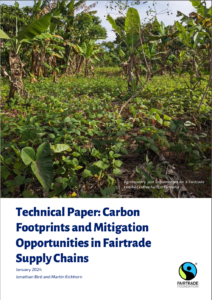Working with farmers to respond to the climate crisis: 5 key learnings for climate mitigation and adaptation programs in supply chains
“There have been long dry spells of late that have affected my coffee farm, so I have spent a lot of money buying inputs” Coffee farmer Naftery Kinyua from Kenya told us. Naftery’s coffee farm is owned by the Mutira coffee cooperative in Kirinyaga county, in southern Mount Kenya, where a changing climate is affecting production and ultimately livelihoods.
Millions of farming families and their communities like Naftery’s are on the front lines of a climate crisis they have done little to cause. Hurricanes, droughts, floods and other extreme weather events affect crops and in some cases destroy a farmer’s only source of income. However, most do not have the capacity to make the necessary changes in production methods to adapt to climate change and prepare for the future.
At Fair trade we understand that climate resilience involving smallholders cannot focus solely on eliminating, reducing and preventing greenhouse gas emissions. It should also prioritize improving the living conditions of smallholder farmers and workers and their resilience to a changing climate.

We recently conducted a study Carbon footprints and mitigation opportunities in fair trade supplies chains. Through this paper, we have identified Five key propositions that we think are useful for any business looking to reduce their scope 3 emissions (indirect emissions created in the value chain) while prioritizing the livelihoods of producers.
These proposals have informed climate programs accompanying Fairtrade’s Minimum Price, Premium Payment and Standards and helped develop a practical approach to climate adaptation in the context of smallholder farmers’ livelihoods.
1. Fairtrade-certified supply chains have a wide range of opportunities and strategies to reduce emissions and remove carbon.
While the exact mitigation potential of each strategy varies by commodity and country context, we found the following to have high mitigation potential:
- Carbon sequestration in soils
- Carbon sequestration in agricultural trees
- Reducing deforestation caused by conversion of forests to cropland
- Reducing the application of nitrogen fertilizers
- Switching to renewable energy sources and/or increasing energy efficiency
In addition to mitigating climate change, these strategies:
- Support corporate inclusion initiatives within supply chains by reducing scope 3 emissions.
- Create carbon credits that can be traded in voluntary carbon markets and create new sources of income for farmers.
- Achieve wider agronomic, economic, environmental or social impacts for farmers, workers and the environment. These effects can be both positive and negative.
As Daniel Wallura Kiell, another farmer at the Mutira coffee cooperative, explains, learning skills that support climate adaptation has many benefits: “Good canopy management has helped a lot because I also use pruning training skills on other farmers’ farms and have increased my income… I will use the information to train other farmers about sustainable agriculture.”
2. Mitigation programs should not focus only on carbon. They should provide many benefits for farmers, workers and their communities.
Implementing mitigation strategies requires time, effort and financial investment at the farm level. If farmers stick with this switch, they should be able to see the benefits, clear and many.
3. Farmers should participate in the decision-making process.
Businesses, farmers and Fairtrade all need to work together to choose mitigation strategies to implement. But farmers must play a key role in weighing potential benefits against potential negative impacts.
4. Smallholder farmers need support to successfully implement mitigation strategies.
To successfully implement exposure strategies, farmers must have the necessary technical knowledge and practical skills. Expert-led training that takes into account farmers’ invaluable local and contextual knowledge is often needed.
The Fair Trade Alliance for Climate-Smart Supply Chains in Africa (FACSCA) in Kenya, Ethiopia and Rwanda has supported coffee, tea and flower producers, including Naftery and Daniel, to become more resilient and adaptable to climate change. One of the key interventions was the establishment of two farmer learning centers and tree nurseries to provide exemplary learning. These training centers include an e-library and a (solar-powered) call center run by trained agronomists with technical expertise and local knowledge to support farmers in implementing adaptive measures.
5. Models to engage farmers in carbon reduction projects must be effective, fair and linked to a sound business case.
When designing supply chain decarbonization projects, there are potential risks, rewards, and investments for everyone involved. However, power dynamics, inequalities and lack of information can leave smallholder farmers vulnerable to exploitation. Incentives should be offered to everyone involved, so all parties are committed throughout the process.
Another practical example is the Inclusive Energy Fund (IEF), which Fairtrade manages with coffee and tea producer organizations in Rwanda, Tanzania and Uganda. Producer organizations applied for funding through the IEF to implement their own initiatives to improve access to clean and green energy for members, meaning they were tailored to needs and context.
IEF has covered a diverse portfolio of projects, from launching a lava rock-powered bakery to a solar-powered parabolic coffee dryer. These projects developed by manufacturers have provided many non-carbon and livelihood benefits, such as generating new sources of income. Now we are raising funds to start the second round of IEF.
Fairtrade is owned by a network of 1.9 million farmers and it is our responsibility to support their adaptation needs as they face increasing commercial demands for mitigation. Using the five principles outlined, we were able to develop a climate programming strategy that goes above and beyond carbon reduction and removal to achieve sustainable livelihoods for farmers at the forefront of the climate crisis.
Ndererimana Jean, a tea grower from the Assopthe Cooperative in Rwanda, told us, “Climate change mitigation is the responsibility of communities.”
Download the executive summary
This article is presented as part of our Climate Justice 2024 Series, which will run parallel to the Climate COP in Baku over the next two weeks. In addition to in-depth articles and podcasts from our global community, we host an online event Community Forum November 21 (10 to 11:15 a.m. EST / 3 to 4:15 p.m. GMT). Join us as we come together as a community to explore how businesses can put people at the center of climate action.

